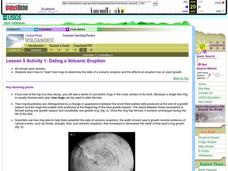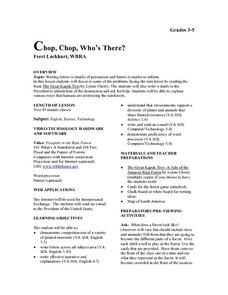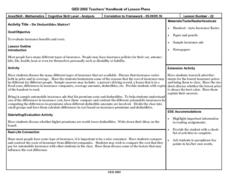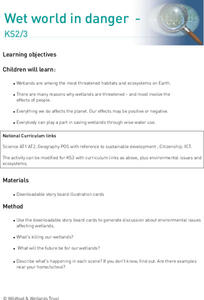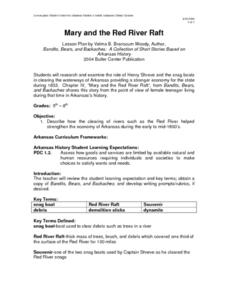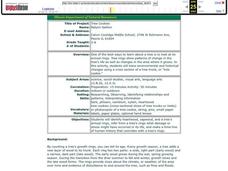Curated OER
Stopping Deforestation in the Amazon: A Publicity Campaign
Students investigate the environment by designing a group project. In this ecology lesson, students identify the man made threats to the Amazon while reading environmentally conscience vocabulary terms. Students collaborate in groups...
San José State University
Avoiding Nominalization
Improve syntax with this explanatory handout. It clarifies one way to make writing more precise: avoiding nominalization. This resource provides four ways to find and change nominalization problems and 10 sentences to correct. There are...
Curated OER
Model Volcanoes
Students represent volcanoes with models and sketches. They research volcanoes and plan how to build a model. They, in groups, build a model volcano and cause it to erupt making observations before and after the eruption.
Curated OER
Defining Drought
Students examine the hydrologic impacts of drought. Humans can change the course of the water cycle, to some extent, to meet their needs, but can they do so without imposing risks on the plants and animals?
Curated OER
The Scientific Method
Young scholars examine the Scientific Method. They will discover the value in being observant, organized, and thorough with regard to science. They will also explore how these traits can serve them well in other areas of life.
Curated OER
Why Kosovo? Why Now?
Students explain the establishment of the modern state of Yugoslavia and the breakup of the country. They examine the human characteristics of the region - ethnic groups, languages, and religions.
Curated OER
Dating a Volcanic Eruption
Young scholars discover how to "read" tree rings to determine the date of a volcanic eruption and the effects an eruption has on plant growth. After a lecture/demo, students utilize a worksheet imbedded in this plan to date an eruption.
Curated OER
Shake, Rattle and Roll
Students explore how to locate the location of an earthquake and why earthquakes happen more frequently in some areas more than others.
Curated OER
Exploring Nature: Powerful Forces
Students observe samples of artwork which use line, shape, and form to show movement and depict natural forces of nature. They create their own piece of artwork that shows a natural force and movement and then write a descriptive...
Curated OER
Chop, Chop, Who's There?
Students write a letter of persuasion about the problems facing the rainforest. They examine and write about how humans are destroying the rainforest.
Curated OER
Do Deductibles Matter?
Fifth graders discuss insurance and the cost of automobile insurance. They compare and contrast the costs of insurance from different companies. They figure the savings from the lowest deductible to the highest deductible.
Curated OER
Now You See Me, Now You Don't
Bioluminescence fascinates most upper elementary scientists. Display images of different glowing deep-sea organisms and discuss their environment. Young biologists then experiment with images and different colors of filtered light. In...
Curated OER
Wet World in Danger
Students investigate the reasons why wetlands are threatened especially by people. They study the wise use of water to preserve wetlands.
Curated OER
Prairie Plant Investigation
Students carefully observe prairie plants and record their observations in a science journal. They examine the root systems of grasses and flowers and surmise how these plants can grow together on the prairie.
Curated OER
Bye-Bye Bison
Fourth graders investigate the bison's struggle for survival. They discuss the importance of bison while participating in an role playing activity showing how important the food supply and surroundings are to their survival.
Curated OER
Please Help!
Sixth graders examine the prairie food chain while designing a rescue strategy for an endangered species. They compare their strategy to that of a professional conservation expert.
Curated OER
Poisoning the Prairie
Seventh graders investigate what pesticides are and why people use them. They examine the effect of pesticides on prairie grasses and what alternatives can be used.
Curated OER
"Hard Times Come Again No More" : Letters From Arkansas Families in the Great Depression
Through this series of terrific lesson plans, pupils learn about the extent of poverty in the state of Arkansas during the Great Depression. They read documents from the period which describe how hard times were, view an online photo...
Curated OER
Mary and the Red River Raft
Upper elementary and middle schoolers examine how the clearing of rivers such as the Red River helped to boost the Arkansas economy of the mid-1800's. They listen to a story called, "Mary and the Red River Raft," then conduct research on...
Curated OER
Responses to Changes in the Environment
Fourth graders study ecosystems, and see how plants and animals must adapt to changes in their environment in order to survive. Pictures of the snow shoe hare in the winter and summer are shown. Learners determine that the change in...
Curated OER
Hos Do the Jaguar and Howler Monkeys in Belize Depend on Us?
First graders access the internet and use the sites provided to research Belize, and in particular, the Howler Monkey and Jaguar. Students participate in activities/centers utilizing the information they discovered.
Curated OER
Tree Cookies
Students identify heartwood, sapwood, and a tree's annual rings, infer from a tree's rings what damage or stress might have occurred in its life, and make a time-line of human history that coincides with a tree's rings.
Curated OER
CO2 and Air Pollution
Seventh graders observe and test for the presence of carbon dioxide gas. They compare concentrations of carbon dioxide gas and conclude high concentrations of carbon dioxide gas are unhealthy for human beings.
Curated OER
Gallery Walk Questions on Rivers
A Gallery Walk is a technique that allows small groups to visit different stations, where they examine and discuss materials about an overarching topic. Questions about rivers and fluvial processes are available in this resource;...








